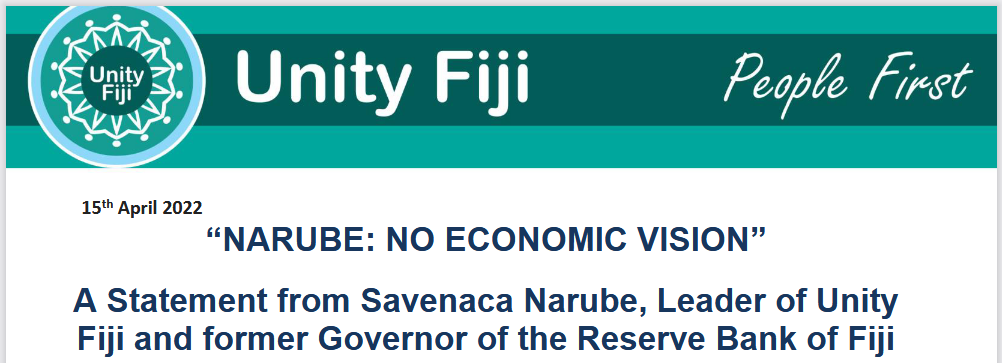The Leader of Unity Fiji, Savenaca Narube, said that Fiji was suffering from deep structural issues that were already here before the COVID-19 struck Fiji. The former Governor of the Reserve Bank of Fiji was addressing the Suva Rotary Club at the Grand Pacific Hotel last Thursday.
Narube explained that these structural problems included rising government expenditures, the low quality of that spending, the high dependency on the fragile tourism industry, and the low level of productivity, amongst others. These fundamental problems were clearly the result of wrong financial choices and poor economic leadership.
Narube stressed that over the last decade, the national budgets seriously lacked a medium to long term economic vision. Instead, the budgets provided temporary relief that would not unshackle our economic potential. For instance, the recent mini budget did not have any plan to diversify the economy. Therefore, rather than build economic buffers through reforms, the Minister continued to increase our economic vulnerability. He had not learnt a thing from the economic crisis of the pandemic.
The Leader of Unity Fiji told the Rotarians that the policy of this Government since it came into power was to borrow and spend. Fiji, with its small size and limited natural endowments, could not afford this irresponsible policy. The deficit of the mini budget was over 10% of GDP at a time that debt was already unsustainable. Government should have started the long and difficult process of clawing back the rate of increase in debt.
In such a hostile climate that Fiji faced now, Narube conceded that borrowing was essential as government revenue stalled. But he clarified that the danger was that these borrowings were spent on unproductive areas. He calculated that this Government had squandered over $12 billion since 2007. Therefore, the Minister should urgently focus, not so much on taxes, but on expenditure reforms.
Narube emphasised that the biggest threat to national unity and peace was the escalating poverty. Poverty was the ultimate test of the success or failure of any government. Poverty before the pandemic was already at 32%. It would now be over 40%. Three quarters of people suffering from poverty were indigenous Fijians. Narube was disappointed that previous national budgets including the mini budget had not acknowledged this fact let alone announced a plan to reduce poverty. To many people, this was a clear sign that this Government had failed and lacked the economic vision to take this country forward.
Narube explained that these structural problems included rising government expenditures, the low quality of that spending, the high dependency on the fragile tourism industry, and the low level of productivity, amongst others. These fundamental problems were clearly the result of wrong financial choices and poor economic leadership.
Narube stressed that over the last decade, the national budgets seriously lacked a medium to long term economic vision. Instead, the budgets provided temporary relief that would not unshackle our economic potential. For instance, the recent mini budget did not have any plan to diversify the economy. Therefore, rather than build economic buffers through reforms, the Minister continued to increase our economic vulnerability. He had not learnt a thing from the economic crisis of the pandemic.
The Leader of Unity Fiji told the Rotarians that the policy of this Government since it came into power was to borrow and spend. Fiji, with its small size and limited natural endowments, could not afford this irresponsible policy. The deficit of the mini budget was over 10% of GDP at a time that debt was already unsustainable. Government should have started the long and difficult process of clawing back the rate of increase in debt.
In such a hostile climate that Fiji faced now, Narube conceded that borrowing was essential as government revenue stalled. But he clarified that the danger was that these borrowings were spent on unproductive areas. He calculated that this Government had squandered over $12 billion since 2007. Therefore, the Minister should urgently focus, not so much on taxes, but on expenditure reforms.
Narube emphasised that the biggest threat to national unity and peace was the escalating poverty. Poverty was the ultimate test of the success or failure of any government. Poverty before the pandemic was already at 32%. It would now be over 40%. Three quarters of people suffering from poverty were indigenous Fijians. Narube was disappointed that previous national budgets including the mini budget had not acknowledged this fact let alone announced a plan to reduce poverty. To many people, this was a clear sign that this Government had failed and lacked the economic vision to take this country forward.


